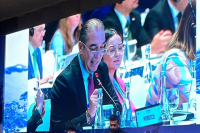Evaluation of Public Policies
In addition to voting on laws, controlling the Government work via written and oral questions and other control mechanisms, Article 70 of the Constitution confers to the House of Representatives the mission of evaluating public policies.
Also, Article 101 of the Constitution dictates the devotion of one annual sitting to the discussion and evaluation of public policies at the Parliament.
Title 7 of Part V of the Rules of Procedure of the House of Representatives, concerning “Government’s accountability to the House of Representatives,” details the rules according to which the competence of evaluating public policies should be implemented.
Article 288 of the Rules of Procedure states that the evaluation aims to lead in-depth research and analyses to identify the evaluate the outcomes of public policies and programs and measure their impacts on the targeted groups and society.
Also, the evaluation aims to identify achievements in comparison with the planned goals and determine the factors that contributed to those achievements. This enables making recommendations and presenting suggestions of enhancements that can be introduced to the public policy under evaluation.
The Rules of Procedure also set out the preparations and the organizational procedures that regulate the convention of the sitting devoted to evaluating public policies. In this respect, the Board of the House determines, at the onset of the legislative year, the public policy that will be evaluated based on the proposals of parliamentary groups and caucuses (Article 289). The Board may also resort to a multi-annual program. The said proposals are submitted along with a preliminary feasibility study, a determining factor in the Board’s decision (Article 290). The study shows the major problems caused by the policy or program in question.
Following its choice of the public policy to evaluate, the Board calls for the formation of a thematic working group that oversees the progress of the evaluation of the chosen subject.
The thematic working group is formed of one representative of each parliamentary group and caucus (Article 291), who designate among them a chairperson and rapporteur, one of which is from opposition groups. The working group:
- Elaborates the referential elements and terms for the evaluation,
- Collects initial data,
- Launches the specialized research,
- Approves the findings of research and studies,
- Makes recommendations and suggestions,
- Prepares the evaluation report.
The Speaker of the House of Representatives may, upon the decision of the Board, in parallel to the work of the thematic working group, at his initiative or the request of the thematic working group, consult the Economic, Social, and Environmental Council (CESE) or, where necessary, any constitutional good governance body to request their opinion or to get them to prepare a study or research on the public policy under evaluation (Article 292). The opinions, studies, research, and reports are referred to the thematic working group for consultation.
The Board of the House sets the date of the plenary sitting devoted to evaluating public policies and defines its agenda (Article 293). It also ensures the circulation of the evaluation reports among deputies at least 48 hours prior to the convention of the plenary sitting. The Speaker of the House of Representatives informs the Head of Government of the date while the Panel of Chairs moderates the general discussion during the sitting.
----------------------------------------------------------------------------------------------------
|
Thematic Working Group in Charge of Preparing a Report on Rural Development |
|
|
August 2nd, 2016 |
|
|
August 2nd, 2016 |
Report of the thematic working group in charge of evaluating the Comprehensive Rural Electrification Program (PERG)– (in arabic) |
|
February 2018 |
|





